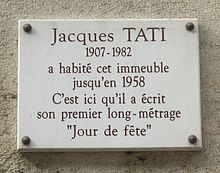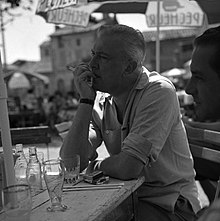Jacques Tati
Jacques Tatischeff (born October 9, 1907 in Le Pecq , Seine-et-Oise ; † November 4, 1982 in Paris ) was a French actor , screenwriter and director who became world famous with his character of the lovable and eccentric "Monsieur Hulot". Although his highly acclaimed work as a director is comparatively small, Tati is considered to be significant for film history thanks to his subtle comedies that are critical of civilization and based primarily on visual humor.
position
With the character of Monsieur Hulot, developed and portrayed by him, and the six feature films (if one counts the television film Parade and five movies), Tati conquered an independent artistic position in film history . As an actor he used pantomime and slapstick and acted in the guise of Monsieur Hulot as a tireless critic of civilization . His humor is more visual; there are usually only a few conversations in his films, but instead often distinctive noises.
As a director, Tati - even if he often conjured up the good old days in terms of content - was far ahead of his time in many ways. So he impressed z. B. through the imaginative use of modern film technology. He was also a loner who sought complete artistic control over his films. In this and in his penchant for perfectionism, he can best be compared with Charles Chaplin and Buster Keaton in the field of film comedy .
Life
Tati was of French-Russian-Dutch-Italian origin. His father Georges Emmanuel Tatischeff (1875–1957) was a son of the military attaché at the Russian Embassy in Paris, Count Dimitri Tatischeff, and the French Rose Anathalie Alinquant. Georges Emmanuel Tatischeff was married to Claire van Hoff (died 1968). Tati was married to Micheline Winter from 1944 until his death. The marriage resulted in a daughter and a son; the director Sophie Tatischeff (1946–2001) was awarded a César in 1978 , Pierre Tati (* 1949) worked, among other things, as a film producer.
Early successes
Jacques Tati started out as a picture frame maker and was a tennis and rugby player. During the breaks he entertained his teammates with funny sports pantomimes. He soon auditioned for a director of a Parisian cabaret , who immediately hired him. Now he celebrated great success in music halls with pantomime scenes in which he parodied sports and travel with various means of transport. In the early 1930s he first appeared in short films, for example as a tennis champion. In 1938 his tour took him through European capitals to Berlin, where he appeared in the comedian cabaret with Werner Finck , Günther Neumann and Tatjana Sais .
Movies
In 1947 Tati had his breakthrough with the first self-written and staged feature film Jour de fête ( Tatis Schützenfest ). Tati produced the film in both color and black and white . Due to technical inadequacies in the then new Thomson color system, Jour de fête was only published in the black and white version. Nevertheless, the film is considered to be the first French color film .
His second film Les Vacances de Monsieur Hulot ( The Holidays of Monsieur Hulot ) takes place in the Hôtel de la Plage (which still exists today as a slightly modified hotel) in a seaside resort (Saint-Marc-sur-Mer, near Saint-Nazaire in Loire-Atlantique department ). It shows for the first time Tati's alter ego Hulot, an amiable individualist with a hat and a long pipe, who is constantly fighting the perils of modern civilization and modern manners. The film won the Louis Delluc Prize in 1953 and the screenplay was nominated for an Oscar in 1956 . A key feature of the film is the almost complete absence of dialogue. The main character Monsieur Hulot, the embodiment of a clumsy antihero , utters almost no intelligible word. And of the few dialogues, most of them are drowned out in loud foreground or background noises or, apart from a few scraps of words, they are mutilated into almost complete incomprehensibility. In his subsequent films, Tati then used more language, mostly in the form of monologues, to support his thoroughly critical worldview. He never wanted to do without sounds, as they are an essential part of our environment and thus influence our feelings.
In Mon Oncle (My Uncle), Monsieur Hulot deals with the ultra-modern house of his sister's family - and with his failure with modern technology and his special relationship with his nephew and the pitfalls of the object. In 1958 the film won the special jury award at the Cannes Film Festival and the French Film Critics Award, and in 1959 the Oscar for best foreign language film .
“Playtime” and the last few years
This success encouraged Tati to start his greatest project. For Playtime (1967) Tati had a huge district set with high-rise buildings built outside of Paris (Tativille). Here Hulot wanders around seemingly endlessly in a Paris that seems to consist only of skyscrapers and office blocks, looking for a Monsieur Giffard with whom he wants to meet. The elaborate playtime turned out to be extremely expensive; Tati shot on 70mm film, the production time was three years, the budget was between five and twelve million francs . Despite a brilliant production design, a visionary camera and excellent press (Danish Bodil film award 1969), Playtime failed at the box office.
Due to the debts that Playtime left, Tati found himself forced in Trafic (1971) to put Hulot back into the focus of the film, which he had actually wanted to avoid. In the film, he tries to get a car prototype to an automobile fair in time.
But Tati could no longer avert his bankruptcy and withdrew from the film business. In 1974 only a circus film for children, produced for Swedish television, called Parade, followed.
In 1977 Tati was awarded the Honorary César of the Académie des Arts et Techniques du Cinema.
Jacques Tati died of a pulmonary embolism on November 4, 1982 and was buried at the Cimetière ancien in Saint-Germain-en-Laye .
2010 French director published Sylvain Chomet with Illusionist an animated film, based on an unpublished screenplay by Tati in 1956 and the famous comedian tackles as the title hero. Chomet had received the script from Tati's daughter Sophie. On the occasion of the theatrical release, the international press reported on the artist's illegitimate daughter, Helga Marie-Jeanne Schiel, who is said to have inspired him to write the script. This comes from a relationship with the Austrian Herta Schiel, with whom Tati is said to have worked during the German occupation in the Parisian variety theater . Tati himself never recognized Helga as his daughter.
Filmography
As a performer, additional functions are indicated separately:
- 1932: Oscar, champion de tennis
- 1934: Raufbold wanted (On demande une brute) - co-author
- 1935: Happy Sunday (Gai dimanche) - co-writer, co-director
- 1936: Pay attention to your left (Soigne ton gauche) - book
- 1938: Retour à la terre - book
- 1945: Sylvia and the ghost (Sylvie et le fantôme)
- 1946: Stormy youth (Le diable au corps)
- 1947: School of Postmen (L'école des facteurs) - script, director
- 1949: Tatis Schützenfest (Jour de fête) - book, director
- 1953: The Holidays of Monsieur Hulot (Les vacances de Monsieur Hulot) - script, director
- 1958: My Uncle (Mon oncle) - book, director
- 1967: Tati's glorious times (Playtime) - script, director
- 1967: Evening School (Cours du soir) - book
- 1971: Trafic - script, director
- 1972: Obraz uz obraz (TV series)
- 1974: Parade - script, director
Script and co-director only:
- 1978: Forza Bastia 78 or feast day on the island (Forza Bastia 78 ou l'île en fête)
Script only:
- 2010: L'Illusionniste
Documentary film
- Jacques Tati - The democratic laugh (original title: Jacques Tati - le rire démocratique) . French TV documentary by Pierre Philippe (2002), 53 min.
literature
- David Bellows: Tati, sa vie, son art . Le Seuil, Paris 2002, ISBN 2-02-040961-5 .
- David Bellows: Jacques Tati: his life and art . London: Harvill Press, 2001, ISBN 978-1-86046-924-4 .
- Jean-Claude Carrière : The Holidays of Monsieur Hulot . Novel based on the film by Jacques Tati. Alexander, Berlin 2003, ISBN 978-3-89581-092-3 .
- Jean-Claude Carrière: The Jacques Tati Package. The holidays of Monsieur Hulot and Mon Oncle . Alexander, Berlin 2006, ISBN 978-3-89581-171-5 .
- Michel Chion : Jacques Tati . Cahiers du Cinéma, Paris 1987, ISBN 2-86642-058-6 (English translation: The Films of Jacques Tati . Guernica, Toronto 1997, ISBN 0-920717-70-5 ).
- Marc Dondey: Tati . Editions Ramsay, Paris 1993, ISBN 2-85956-698-8 .
- François Ede, Stéphane Goudet: Playtime . Cahiers du Cinéma, Paris 2002, ISBN 978-2-86642-333-9 .
- Penelope Gilliatt : Jacques Tati . Woburn Press, London 1976, ISBN 0-7130-0145-3 .
- Michael Glasmeier / Heike Klippel (eds.): Playtime - interdisciplinary film. One film and eight perspectives. Lit Verlag, Münster 2005, ISBN 978-3825883751 .
- Stéphane Goudet: Jacques Tati - de François le facteur à Monsieur Hulot . Cahiers du Cinéma, Paris 2002, ISBN 2-86642-340-2 .
- Peter Haberer: Aspects of comedy in Jacques Tati's films . Essays on Film and Television (Volume 25). Coppi-Verlag, Alfeld / Leine 1996, ISBN 3-930258-24-2 .
- Brent Maddock: The Films of Jacques Tati (Original title: The Films of Jacques Tati) . Heyne Film Library No. 187. German by Karola Gramann and York von Wittern. Afterword by Gertrud Koch. Heyne, Munich 1993, ISBN 3-453-06550-6 .
- Wolfram Nitsch: From the roundabout to the carousel: Non-places as strange leeway with Jacques Tati . Romance Studies 3 (2016), online .
- Giorgio Placereani, Fabiano Rosso (eds.): Il gesto sonoro - Il cinema di Jacques Tati . Editrice Il Castoro, Milan 2002, ISBN 978-88-8033-236-7 .
- Alison Castle: Jacques Tati. The Complete Works (five volumes in a slipcase), TASCHEN, Cologne 2019, ISBN 978-3-8365-6681-0
Web links
- Literature by and about Jacques Tati in the catalog of the German National Library
- Link catalog on Jacques Tati at curlie.org (formerly DMOZ )
- tativille.com , website of the company Les films de mon oncle , which holds the rights to several Tati films (English / French; requires the Flash Player )
- Jacques Tati in the Internet Movie Database (English)
- Jacques Tati - Georg Seeßlen about Jacques Tati
- Jacques Tati interview (Münchener Abendzeitung 1972)
- Pronunciation of the name Jacques Tati on Forvo.com
- Scientific literature (Open Access) on Jacques Tati on mediarep.org
Individual evidence
- ↑ Number of the extrait de naissance on www.lesgensducinema.com (French)
- ↑ Michel Chion : The films of Jacques Tati , 2003, ISBN 978-1-55071-175-2 , p. 161 (English)
- ↑ Sophie Tatischeff in the IMDb (English)
- ↑ Pierre Tati in the IMDb (English)
- ↑ Roland Beyer: "That's Monsieur Hulot!" In: Die Zeit . May 29, 1959, ISSN 0044-2070 ( zeit.de [accessed November 30, 2019]).
- ↑ cf. Johns, Ian: Cut the cute ( Memento from February 20, 2007 in the Internet Archive ) at timesonline.co.uk, February 17, 2007 (English)
- ↑ cf. Thorpe, Vanessa: Tati's lost film reveals family's pain . In: The Observer , January 31, 2010, p. 41
- ↑ cf. Samuel, Henry: Tati's guilt over the daughter he abandoned . In: The Daily Telegraph , June 17, 2010, p. 19
| personal data | |
|---|---|
| SURNAME | Tati, Jacques |
| ALTERNATIVE NAMES | Tatischeff, Jacques (full name) |
| BRIEF DESCRIPTION | French actor, screenwriter and director |
| DATE OF BIRTH | October 9, 1907 |
| PLACE OF BIRTH | Le Pecq , Seine-et-Oise |
| DATE OF DEATH | 4th November 1982 |
| Place of death | Paris |


